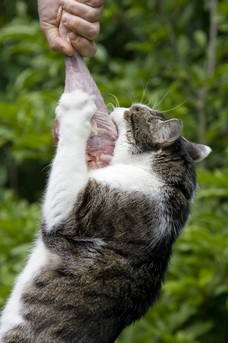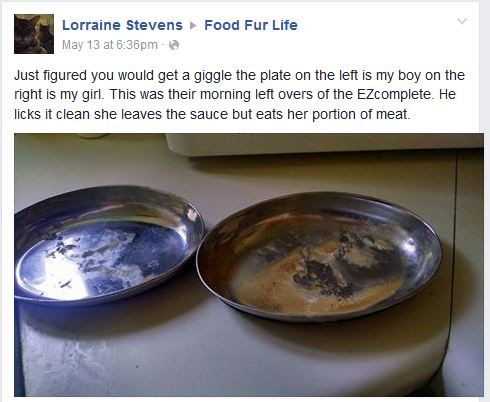
Why are our cats in so much gastric distress?
According to VPI Insurance, digestive issues in cats (both vomiting and diarrhea) are consistently ranked as one of the top reasons for a vet visit. Inflammatory Bowel Disease joined them on the list of top 10 reasons for a vet visit each the past two years. This makes three of the top 10 reasons for vet visits related to GI problems in our cats. According to Dr. Gary Norsworthy, who led a study of chronic vomiting in cats, it is so frequent (present in 73% of cats with small bowel disease), many veterinarians and cat owners simply write-it off to
What the heck is going on? When we have a young child, we would never accept from a doctor that chronic vomiting is because our child is "just a puker." We would never accept that chronic diarrhea is "just how some kids are." What is Feline IBD? Let’s start with what Feline IBD (Inflammatory Bowel Disease) is. Like that in humans, IBD is a group of diseases involving mild- to severe gastrointestinal (GI) inflammation, and it can lead to lymphoma. This inflammation has been definitively linked to gut dysbiosis (bacterial imbalance in the GI tract). Technically an autoimmune disease, IBD was thought to have a genetic component, but recent research has discovered that the process that triggers IBD is actually transmissible. GI motility problems (vomiting, diarrhea, constipation) can both cause and be exacerbated by a bacterial imbalance. In IBD, that imbalance has caused inflammation that often impacts nutrient absorption (which is why seeming unexplained weight loss can occur, and why B12 and folate blood serum levels are part of the diagnostic process). In IBD, the symptoms that present are related to where in the GI tract the inflammation is located. Symptoms can come and go, often in cycles of frequent vomiting or a period of diarrhea – which is why the symptoms so often go improperly diagnosed. Treatment and Management of IBD: Traditional IBD Management Does Not Address the Underlying Cause The typical approach is for vets to have pet parents use “prescription” diets for sensitive stomachs / high fiber diets for hairballs / hydrolyzed “hypoallergenic” diets, or “limited ingredient” diets and to prescribe goop for hairballs, antacids for stomach upset, and/or anti-emetics (metoclopramide [Reglan], maropitant [Cerenia], ondansetron [Zofran]) to stop the vomiting and nausea; steroids to control inflammation; and Flagyl (metronadizole) to control diarrhea. As Dr. Norsworthy says, “often there is improvement in clinical signs, but rarely are they completely relieved. In addition, the improvement often diminishes over time.” Unfortunately, this traditional treatment of Feline IBD does not address the underlying cause, it treats the symptoms. Not surprisingly, it has been shown that diet is directly related to the gut microbiome in humans: this holds true for cats, too. Healing of the GI tract can only begin by recognizing our cats as the obligate carnivores they are. Feeding them species-appropriate food that supports their proper intestinal pH and bacterial populations is imperative to long term healing. Diet is the Foundation of Health: this is critical for IBD in cats While it is incorrect to say that a raw diet “cures” Feline IBD, feeding cats the high quality, human grade, fresh meat-and-organ based diet their digestive systems are designed to metabolize enables those systems to return to physiological balance - and when combined with appropriate human grade probiotics to restore healthy intestinal bacteria that has been damaged by many factors apart from diet (including antibiotics, dewormers, vaccinations, stress, etc.) many cats experience healing of the inflammation caused or aggravated by commercial (including "prescription") diets and the alteration in their microbiome. The evidence is only anecdotal at this point, but far too many cats transitioned to a raw diet see their symptoms of IBD (whether vomiting or diarrhea) clear up almost overnight. Notably, the All Feline Hospital says they “started trying commercial raw food diets with amazing results” (in cats with IBD). They further state “We have had cats with confirmed by biopsy IBD that had severe IBD and significant symptoms that had to be on very high doses of steroids just to have some quality of life. Many of these cats had a complete reversal of signs and symptoms by going to an exclusively raw food diet, and were able to either come off of all medications, or at the very least, drastically reduce their medications.” (Bold, our emphasis) Food processing, the use of thickeners, high temperatures, species-inappropriate foods containing even medium amounts of carbs and/or starches), dry vs wet foods vs raw, protein content – all of these things impact feline gut microflora and thus motility and inflammation in our cats. This means that to best help our kitties heal, we need to feed them the food they were meant to eat: a diet based on fresh, raw, high protein food. (Raw is preferable to cooked, but cook it if you are not comfortable feeding raw: fresh, unprocessed, truly human grade meat and organs – a food with no unnecessary additives – is still better than highly processed food, no matter the perception of quality). Of course, with EZcomplete fur Cats, it is – well – really easy to feed fresh homemade food – and IBD cats are thriving on it. For more information on the treatment and management of IBD in cats, please visit the website Raw Feeding for IBD Cats. This blog post has been added to the growing collection of educational articles provided by Food Fur Life, LLC Raw Feeding and IBD in Cats
0 Comments
Your comment will be posted after it is approved.
Leave a Reply. |
Archives
August 2021
Categories
All

|


 RSS Feed
RSS Feed